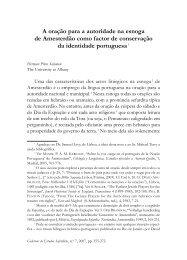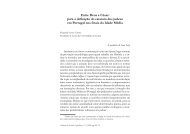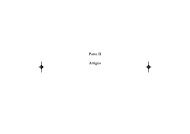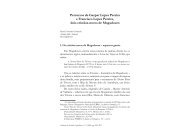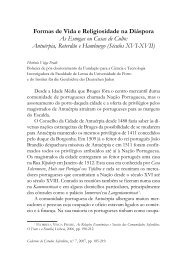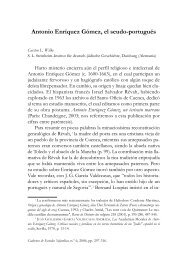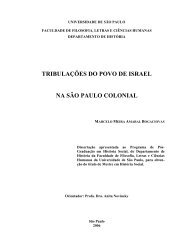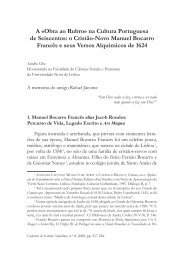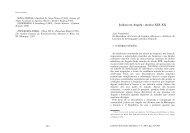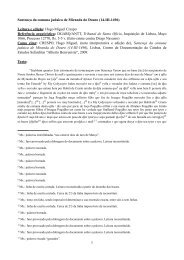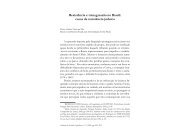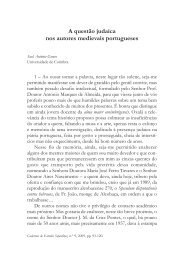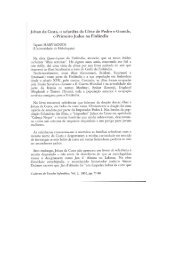Pagina 1-28.qxd - Cátedra de Estudos Sefarditas "Alberto Benveniste"
Pagina 1-28.qxd - Cátedra de Estudos Sefarditas "Alberto Benveniste"
Pagina 1-28.qxd - Cátedra de Estudos Sefarditas "Alberto Benveniste"
Create successful ePaper yourself
Turn your PDF publications into a flip-book with our unique Google optimized e-Paper software.
Pag 33-62:<strong>Pagina</strong> 1-<strong>28.qxd</strong> 10-12-2009 01:13 Page 47<br />
KIng ManUel I anD tHe exPUlSIOn OF tHe CaStIlIan ConvERSoS anD MUSlIMS...<br />
only “two or three days” after the conclusion of the marriage contract<br />
on 30 november 1496. they thus received the news of the ex -<br />
pulsion edict on circa 2 or 3 December 1496. It is thus impossible<br />
that they would be referring to the news of the expulsion of Jews<br />
and Muslims from Portugal, which was only ma<strong>de</strong> public on 5 De -<br />
cember. there can be little doubt that Isabel and Fernando were<br />
referring in their letter to the or<strong>de</strong>r of expulsion directed against<br />
the Castilian conversos in Portugal, whose existence is recor<strong>de</strong>d in the<br />
transcript of the official minutes of the town council of Silves<br />
(which have already been discussed further above). this expulsion<br />
edict directed against the Castilian conversos had been issued by<br />
Manuel I two weeks earlier at Santarém on 14 november 1496 and<br />
it is entirely plausible that, given the distances involved and the<br />
harsh weather of the winter season, news of the anti-converso expulsion<br />
edict only reached Burgos on 2 or 3 December.<br />
the confusion relating to the exact i<strong>de</strong>ntity of the “heretics” is<br />
not simply the fault of mo<strong>de</strong>rn historians but in reality dates back<br />
to the very first Portuguese accounts of these events. In this respect,<br />
there is in<strong>de</strong>ed a major divergence between Spanish and Portuguese<br />
sources. the aragonese chronicler zurita consistently refers to<br />
“heretics” in his work but, in the sixteenth century, the Portuguese<br />
authors Damião <strong>de</strong> góis and the Bishop of Portalegre amador<br />
arrais, for instance, both wrote that the Infanta had called for the<br />
expulsion of the “Jews” (ju<strong>de</strong>us). 28 In this period, the Castilians and<br />
aragonese consistently employed the term “heretic” to <strong>de</strong>scribe conversos<br />
and never applied it to the Jews. It was an extremely common<br />
popular insult in Castile and aragón to <strong>de</strong>scribe a converso as a Jew<br />
but the reverse never took place. no one in either Castile or aragón<br />
would ever have referred to a Jew as a converso! It is in<strong>de</strong>ed clear that<br />
28 “La princesa lo differia pidiendo que auia el Rey don Manuel <strong>de</strong> echar primero <strong>de</strong> su reyno, todos<br />
los que se auian recogido a el, por miedo <strong>de</strong> la inquisition: cõtra quien se auia procedido en ausencia, y<br />
estauã con<strong>de</strong>nados, como conuencidos <strong>de</strong> hereges.” J. zURIta, Historia <strong>de</strong>l Rey Don Hernando el Catholico.<br />
De las Empresas, y Ligas <strong>de</strong> Italia (zaragoza, 1610), fol. 124v.<br />
47



